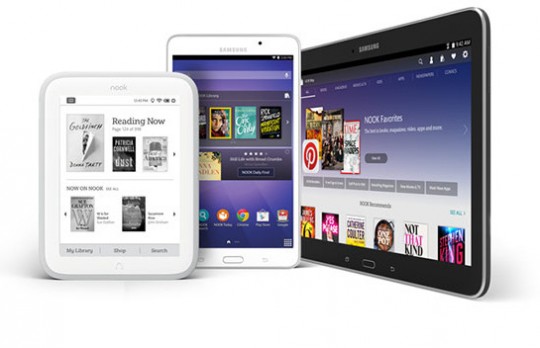Once again Barnes and Noble is backtracking on one of their earlier business decisions. Last June B&N announced that would be spinning off the Nook portion of their business into a separate company.
As it turns out, that’s not going to happen. Barnes and Noble’s new plan is to separate their college business, which consists of 714 stores on college and university campuses throughout the United States, into a separate publicly traded company.
Nook Media has been dragging down B&N’s much more successful college business for the past several years, so the separation makes sense.
Plus B&N is going to have a lot more success getting people to invest in their college bookstore business than the struggling Nook, which has been steadily declining year after year.
In fact, revenues for B&N’s Nook business declined over 50% from the previous year, which was down over 35% from the year before that.
It just keeps going from bad to worse for Nook. You’ve got to wonder where things go now. B&N says they plan to keep their retail business and Nook business together now, but how long is that going to last before they change their minds again?
Michael P. Huseby, Chief Executive Office of Barnes & Noble, had this to say in the press release:
“Separating Barnes & Noble Education will create an industry-leading, pure-play public company with more flexibility to pursue strategic opportunities in the growing educational services markets. At the same time, Barnes & Noble will be able to better capitalize on improving industry trends and merchandising initiatives within its core Retail business. Retail and the NOOK Digital Business will be able to leverage a more integrated technology infrastructure for improved efficiency and to better serve digital customers.”
Really? So what’s the plan for Nook exactly? That sounds like a bunch of empty marketing jargon with no actual meaning, but what do you expect from a press release. Basically they couldn’t find a way to get rid of Nook Media and now they’re stuck with it. But at what point does the continued downward spiral of Nook revenue losses become too much?


This just makes me sad. I love Barnes & Noble and the Nook is a good product. However, there seems to be no leadership at the executive level, which is shocking to see.
You stole the words out of my very mouth.
Better executive leadership is surely needed. However, it is very hard to overcome the strangle hold the “Kindle” brand has over the e-reader market in the US. When you are reading on your reader in public and everybody who comments says something about your “Kindle” regardless if your particular device is a Nook, Kobo, Sony, whatever, that kind of barrier is hard to overcome. For the uninformed if they decide that they want to try and e-reader, they will invariably search the internet for a “Kindle” because they think all e-readers are Kindles. So since they searched “Kindle” that is generally what they end up buying.
I, personally, avoid any brand that has this situation as it usually results in overpriced devices and many times lack features. I have owned may e-readers, tablets, and digital media players, but I have never owned a Kindle or from Apple.
I’ve been a NOOK partisan since I bought my NOOK 3G just about five years ago. But I think the cause is lost. Maybe it’s simply a failure of imagination on my part, but I don’t see any way that B&N can ever make NOOK catch back up with Kindle.
In My Opinion, the root cause is B&N executives’ total lack of concern for their customers. In contrast, Amazon has made it a point to be customer-friendly, even if it loses them money.
The list of B&N’s customer-antagonizing decisions is quite lengthy, but I think the one that did the most damage was refusing to put the Google Play store on the NOOK HD and HD+. That resulted in NOOK having a shockingly weak Christmas season in 2012, a setback from which NOOK never recovered. The NOOK HD and HD+ finally started selling once B&N relented and put Google Play on them — I bought one myself — but by then it was way too late. Nobody cared about NOOK any more; Amazon had won.